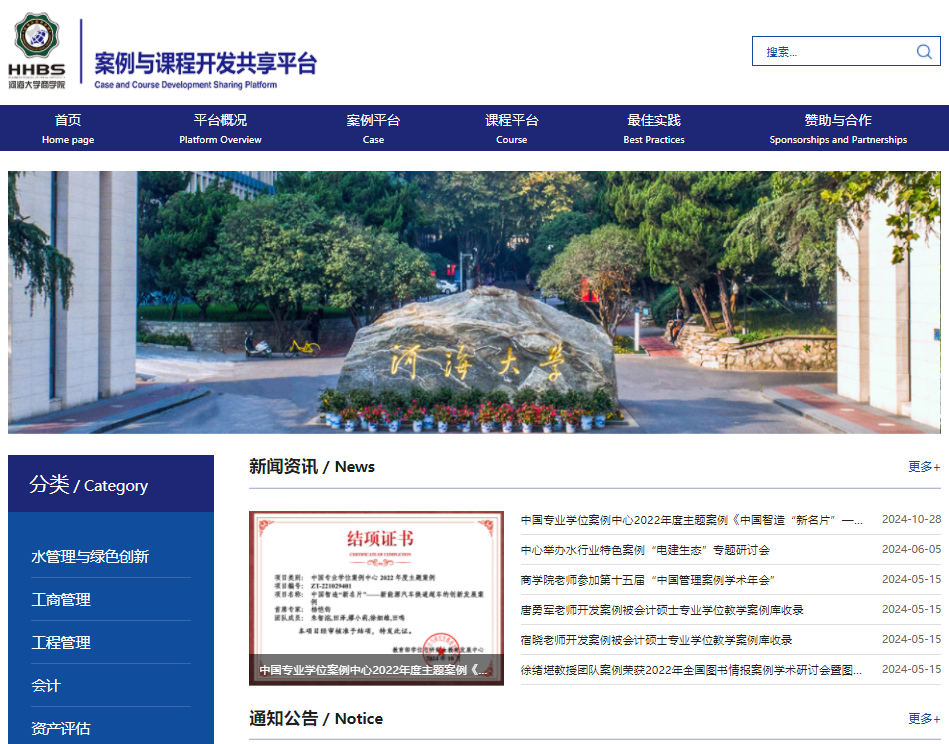Case Development Team and Process
The platform follows a problem-oriented and practice-driven principle. Cases are developed under the leadership of HHBS faculty, in collaboration with executives from water-sector enterprises and experts from government agencies. The development teams conduct on-site visits to hydraulic projects, water utilities, and port operations. Through field research, interviews, and data collection, they extract real-world management challenges with high research value.
Case Types and Thematic Coverage
The platform contains both long-form and mini cases to meet diverse teaching needs. Long-form cases offer systematic analysis of managerial challenges, while mini cases focus on specific aspects of management. The six core thematic areas are:
(1) Watershed Management: Topics include ecological compensation, soil and water conservation, and flood management in major river basins like the Yellow River and Yangtze River, exploring long-term integrated governance mechanisms.
(2)Water Utilities and Environmental Protection: Covers areas such as rural drinking water safety, PPP projects for wastewater treatment, and smart water management, reflecting technological innovation and changes in management models.
(3)Water Engineering Management: Focuses on the full life-cycle management of water infrastructure, showcasing environmental innovations in project planning, construction, and risk management.
(4)Shipping and Port Management: Includes case topics such as port investment and financing, ship lock operations, and inter-modal rail-water transport, delving into the complexities of the shipping value chain.
(5)Water Assets and Green Finance: Explores emerging areas such as green bonds, water rights trading, and REITs, highlighting the financialization of water assets and realization of their ecological value.
(6)Water Scenic Areas and Ecological Restoration: Focus on Eco-tourism development and ecological restoration projects for water resources, demonstrating how ecological assets can be transformed into economic advantages.
Case Application and Teaching Integration
The platform is deeply embedded in the HHBS curriculum and has been integrated into over 20 courses, including Strategic Management, Financial Management, and Introduction to Engineering Management. It also supports practical teaching for professional degree programs such as the MBA and MEM. Students participate in case development and enterprise research, strengthening their problem-solving capabilities. Some cases have been included in national-level platforms, such as the China Professional Degree Case Center and the China Management Case Sharing Center, enabling resource sharing at a national scale.
Societal Value of the Case and Course Development Sharing Platform
(1)Supporting Industry and Policy Decision-Making
The platform offers practical insights and referential management models for water-sector enterprises. For instance, the case Employee Training System at Changzhou CGX Water Company provides guidance for HR optimization, while the case PPP Project for Rural Sewage Management in Zhao'an County offers policy reference for local government environmental projects. Some cases have been directly cited in government policy development, such as the Yellow River Basin Ecological Compensation Case, which supported evidence-based policy-making.
(2)Promoting Academic Research and Disciplinary Development
The platform has driven academic innovation in water management. In-depth exploration of these cases has led HHBS faculty to publish high-impact research papers, creating a virtuous cycle of case research – theoretical innovation – practical application. Additionally, the Case and Course Development Sharing Platform has become a vital platform for interdisciplinary research between "Hydraulic Engineering" and "Management Science and Engineering" at Hohai University, advancing cross-disciplinary talent training models.
